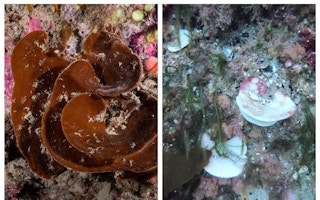New Zealand’s Fiordland National Park is nestled within Te Wāhipounamu, a UNESCO World Heritage Site whose beauty, biodiversity and importance to scientific research is globally recognised. But while visitors may marvel at the park’s snow-capped mountains, lush forests, and fiords like the world-famous Milford Sound, scientists have recently uncovered a troubling development off the coast.
Earlier this month, mass sea sponge bleaching was observed in New Zealand for the first time. Since November last year, the country has been dealing with its strongest marine heatwave in 40 years, with Fiordland reporting ocean temperatures five degrees Celsius warmer than the average. This sudden temperature gain has caused up to 95 per cent of the Breaksea and Doubtful Sound’s usually healthy brown sponges to lose their photosynthetic symbionts, turning them a chalky white. According to Victoria University of Wellington’s Professor of Marine Biology James Bell, the depth of damage was extensive, occurring 8 to 40 or possibly 50 metres below the surface.
Although bleached sea sponges may bounce back, marine ecosystems have much to lose should these creatures fail to revive.
In an interview with Eco-Business, Lim Swee Cheng, a researcher at National University of Singapore’s Tropical Marine Science Institute, outlined the important roles sea sponges play in both tropical and temperate waters. Being efficient filter feeders with complex body structures, they not only regulate important components like carbon in the seawater, but also provide habitats for many marine organisms. Some species of sponge can even break down and recycle the calcium carbonate from dead corals and molluscs.
Given the important contributions sponges make to marine environments and biomedical research, scientists worry about their future.
“Sponges have also been found to contain bioactive compounds with medicinal properties, as anti-cancer agents. The nutrient recycling and movement of carbon from the water column to the seafloor provides food for organisms at the base of the food chain. While [in temperate climates] they do not have direct economic value, without the sponges we would have less fish to eat, so they are economically important too,” Bell said.
In developing tropical island nations, sea sponges also play an important socioeconomic role. With global temperatures likely to increase by 1.5°C in the next five years, ocean temperatures will also increase, causing the ocean’s acidity to rise and oxygen levels to fall in step. As sponges are generally more tolerant of these increasingly hostile conditions, scientists are observing that they are overtaking ecosystems once dominated by coral reefs. But this “regime change” is by no means a net gain for marine ecosystems.
Bell said: “One of the big differences between sponge and coral-dominated reefs is the level of habitat complexity. Sponge reefs are not as complex as coral reefs, and so make less vibrant habitats for marine organisms, resulting in less fish and other food species overall.”
Sponge communities
For coastal communities like Jambiani in Zanzibar, Tanzania, warming waters would make traditional livelihoods like seaweed farming much harder. However, sustainably sourced, hand-harvested sponges are high-value products which can sell for more than US$30 apiece. Therefore, building enterprises around more valuable, resilient sponge species could potentially provide communities with a more stable and environmentally-sustainable source of income.
“
I can now begin the process of building my own home. These sponges have really changed my life.
Nassir Hassan Haji, sponge farmer, Jambiani
Switzerland-headquartered non-government organisation Marinecultures.org has worked to educate seaweed farmers for the past 13 years, and aims to create an environmentally sustainable seaweed farming community.
“[Zanzibar sponges] are processed and sold directly by the farmers’ cooperative in a Fairtrade system where the farmer gets 70 per cent and the shop 30 per cent. Quality control and management is slowly being transferred to the cooperative so that Marinecultures.org can exit the project by the end of 2022. The training of farmers has already done. We are slowly reaching our goal,” said the NGO’s founder Chris Vaterlaus in an interview with Eco-Business.
According to researchers from the University of Dar es Salaam, more than 90 per cent of seaweed farmers are women, who typically face difficulties finding work. Initiatives like the Zanzibar sponge farms have shown how economic opportunities are key to stimulating female empowerment and gender equality in developing countries.
“I am a divorced, single mother. The income I have now is just enough to pay for my children’s education and to buy better food for all of us. Plus, I can now begin the process of building my own home. These sponges have really changed my life,” said Nassir Hassan Haji, a Jambiani sponge farmer.
Marinecultures.org now plans to replicate its sponge farming initiative in Tunisia, whose fishing industry has been heavily compromised by overfishing and degraded seagrass meadows, which are integral to replacing fish stocks.
Vaterlaus added: “We have just come back from an evaluation trip and are now working on a detailed plan to get permission from the Tunisian government and start fundraising. If we succeed in developing a working business there, many jobs will be created.”
While resilient sponges have provided hope for vulnerable coastal communities, they are not invincible. Last September, Marinecultures.org reported that Zanzibar farmers lost 90 per cent of their sponges due to a suspected cynanobacteria infection. Fortunately, the farmers were able to recover by selling their reserve stock and moving the surviving sponges to deeper water.
As rising sea temperatures will likely make cyanobacteria and algal blooms more frequent and extensive, the sponges and the hard-won progress they have enabled cannot be taken for granted.

















